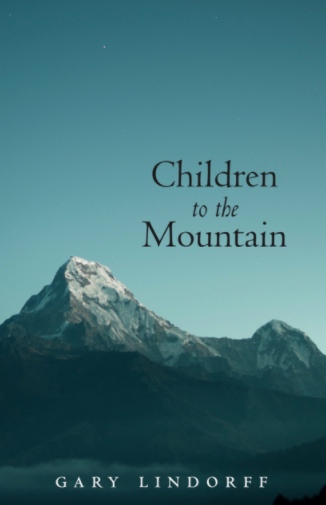Sometimes being in the United States
Is like walking barefoot
Over broken glass,
Or walking on hot sand.
Having a conversation with someone
Who doesn’t get a thing about me
Feels like being brushed by nettles.
Am I even wearing clothes?
Everything gets through!
The climate here is chilling.
Where am I?
Is this still home?
Where did all those corners come from
That I keep bumping into.
I’m not accident prone;
It’s the environment that has become
Angular, unnavigable.
The news is acidic and keeps coming back up!
It’s like someone installed an invisible fence:
I keep getting zapped.
Yesterday I was listening to someone’s story
About how they dealt with a pest
And my heart skipped a beat
When their supposedly amusing story
Morphed into a confession
Of unconscious cruelty.
Like a splinter
Burying itself in my unsuspecting hand.
Or simply seeing what they’ve done
To places that used to be beautiful
Feels just plain shitty.
My native land can be a very painful place to live,
And I’m an educated White man.
I can’t imagine what it’s like,
Can’t imagine what it’s like,
Can’t imagine what it’s like
To be a person of color
In the United States.
—Gary Lindorff
Is Trump Going Off the Rails or Just Possibly Getting Back on Track?
Here’s a bizarre contrarian thought — one admittedly based on limited and dubious evidence, that flies in the face of a more than a year’s contrary evidence, and that is more along the lines of a desperate hope than reality, but what the hell. Bear with me:
Suppose for a moment that President Donald Trump, a narcissistic man of little intellect and even less intellectual rigor, but with a pretty acute sense of the nation’s political mood, has realized that he has been pushed by the so-called “permanent government,” over the past year, far away from his stated intention expressed during the 2016 campaign to re-set relations with Russia on more friendly terms, and away from his call to pull the US military back from its over-extended involvement in wars in the Middle East, Africa, Latin America and eastern Europe, and to instead focus on rebuilding the US economy. Suppose that his recent behavior and decisions, which the corporate media for the most part are portraying as the desperate actions of a man abandoning his advisors and deciding to “go by his gut instincts instead,” are not that at all. Suppose instead that he has decided to fight back against the concerted effort over the past year by the Washington foreign policy and intelligence establishment to hem him in and prevent him from doing those things he had wanted to do.
Okay, I know it’s a stretch, but if all that were in fact the case, could the tossing out of another 60 Russian diplomats in support of Britain’s spurious and fact-free accusation of a Putin-ordered poisoning of a former Russian double agent and the naming of the horrifying Neocon warmonger John Bolton as his new and third national security advisor have been something different than they appear? Could they be not a sign that Trump wants to both ramp up a new Cold War against Russia and to launch wars against North Korea and Iran, but rather actions designed to shore up his conservative wing, while he actually returns to his original campaign-enunciated intention to de-escalate US foreign policy, and build a new era of cooperation and friendship with Russia?
 Trump: crazy or crazy like a fox?
Trump: crazy or crazy like a fox?
The only real evidence for this wild speculation I’m offering here is the rambling campaign-like speech Trump gave on Thursday to assembled union workers in Ohio, in which he claimed that the US campaign in Syria — where over 2000 US special forces troops are leading a group of anti-Assad rebels ostensibly against ISIS forces, though also often against Syrian government troops — is “winning” and that those troops will “be home soon.” He also, in that speech, decried, as he did a month ago, the alleged $7 trillion the US has spent on military campaigns in the Middle East, from Libya to Syria and Iraq and Afghanistan, which he correctly notes have won the US “nothing,” and he promised to end those efforts, to bring the troops home, and to refocus government policy on “building jobs and infrastructure at home.”
Poem by Athalia Allen to commemorate a powerful day
My wife, Shirley, and I attended a rally and march in Rutland Vermont, Saturday, 3/24/18, the day of March For Our Lives, a true milestone in American history, not just because of the size of the turn-out nationwide and world-wide, but because all of the marches and rallies were largely organized and led by youth. If there wasn’t a movement before, there is now.
This hauntingly beautiful poem is by Athalia Allen, freshman at (Vermont) Rutland High School. Actually these words are lyrics to a song she composed and sang for the rally in Main Street Park, to a gathering of 500.
I Hear You Crying
Breathe in blood red moon,
I hear you crying.
Breathe out dark sky,
I feel you shining.
On my face
When the night falls.
And the brook calls your name.
Tiptoe waiting wind
I smell the rain.
Challenge me crashing waves
I feel your spray.
On my face
When my dress and my soul fly in the wind.
Closed are my eyes,
For I too am crying.
You can’t pull a trigger and murder the sun.
Yet you can put a hole in the ground.
My soul is speaking and so is my mind.
Yet my voice doesn’t make a sound.
Breathe in blood red moon,
I hear you crying.
Breathe out dark sky,
I feel you dying.
You’re exhausted
When the night falls.
And the brook calls your name.
Breathe in blood red moon,
I hear you crying.
—Athalia Allen

School Bosses Across America Go 'Butthead' On Anti-violence Student Protests
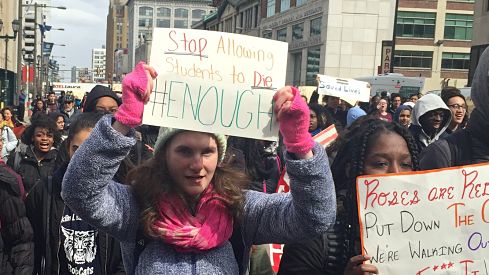 'Walkout' march in Philadelphia – a city where school officials did not penalize participants. LBWPhoto
'Walkout' march in Philadelphia – a city where school officials did not penalize participants. LBWPhoto
Ten days before American student outrage over gun violence triggered multitudes across the U.S and around the world to join in “March For Our Lives” protests; many U.S. high school educators and other adults provided students with strident lessons in assholelisity.
During the March 14, 2018 National School Walkout Day staged by students to show sympathy for the victims of the February high school massacre in Florida, administrators and adults employed threats and punishments to squash students from protesting against the lack of gun control measures across America – the nation with are more guns than people.
School administrators asserted reasons for their harsh response to Walkout participants that went from claims of maintenance of order inside schools to contentions that the Walkout was a political statement that had no place in schools.
A student at a high school outside of Philadelphia, Pennsylvania saw “hypocrisy of the highest order” in administrators cracking down on participants in the National Walkout. At the school this student attended, administrators slapped over 200 protesting students with detentions that required coming to school on Saturdays.
“They tell us in announcement everyday to be the change you want to see in the world. And then when we tried to do it, they told us we couldn’t,” Pennridge High School student Anna Sophie Tinneny told a reporter.
While many school officials nationwide did not oppose the determination of students to participate in the National School Walkout Day, the reactions of some school administrators and other adults to that protest oozed assholelisity.
Citizens Show Up to Tell a Do-Nothing Government Enough is Enough
I have learned one thing. As Woody says, “Showing up is 80 percent of life.” Sometimes it’s easier to hide home in bed. I’ve done both.
- Marshall Brickman, co-screenwriter with Woody Allen of Annie Hall
WASHINGTON DC – The political situation in Washington and around the country is so rotten and demoralizing, so hopelessly polarized, that an outspoken group of high school kids who survived a shooting incident by an alienated lunatic with an AR15 have filled a leadership gap. For this reason, the March For Our Lives in Washington DC on March 24th was like a fresh ocean breeze in a smog event. We’re told 800,000 people took time off and made it to the capital city in political solidarity with the students of Marjory Stoneman Douglas High School in Parkland, Florida, where 17 students and staff members were gunned down in just over six minutes on February 14th beginning at 2:20 in the afternoon. In some 800 other cities around the country, similar outbreaks of support occurred on the 24th. And there hopefully will be more to come.
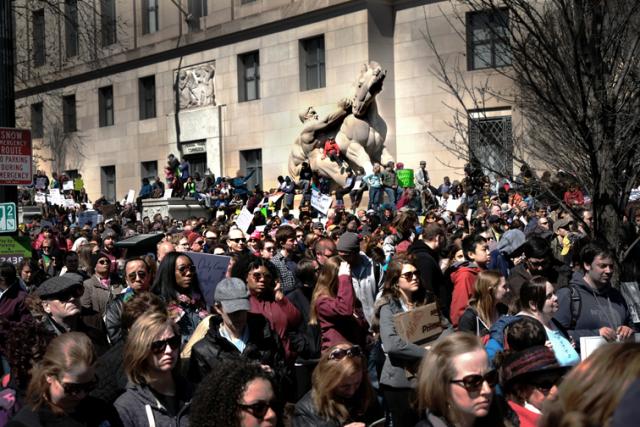 Marchers at the Federal Trade Commission
Marchers at the Federal Trade Commission
 .
.
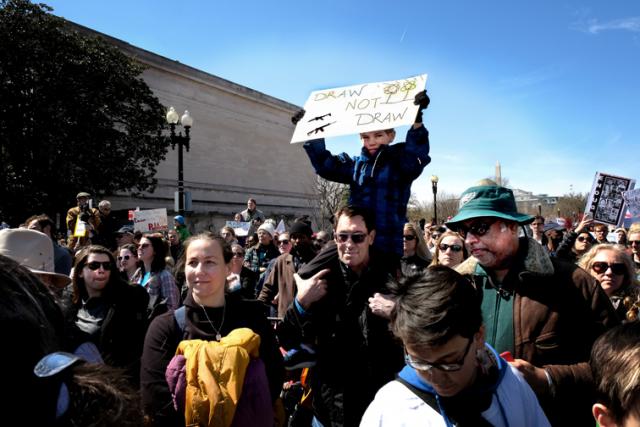 .
.
War Monger and War Criminal John Bolton to Head Trump's National Security Council
 John Bolton as Trump National Security Advisor: Back from the dead along with Neoconservatism
John Bolton as Trump National Security Advisor: Back from the dead along with Neoconservatism
John Bolton, the man named this past week by President Trump to be his new national security advisor, is like that hand from a bloated, rotting corpse of the torturing rapist local yokel that erupts from the water at the very end of the movie “Deliverance,” returning to remind its former victims of the horrors they had endured earlier and thought they’d finally rid themselves of.
One of the most bloodthirsty members of a gang of war-mongering neo-conservatives (almost all, like him, having no military experience themselves), who ran foreign policy and launched wars of aggression during the Bush/Cheney administration, Bolton is a man who for years has been pushing for an imperial US policy to combat domestic economic decline. According this numbskull notion, Washington should attempt to maintain US primacy in the world affairs through force of arms, picking fights, starting wars, overthrowing governments a playing existentially risky games of chicken with nuclear powers like Russia and China. He and the wacko ideology known as neoconservatism, have returned with Bolton as a National Security Advisor, in this case to advise a president who thinks nuclear weapons are meant to be used.
Now I’m not one who thinks that military experience should be seen as some kind of prerequisite, much less a positive attribute, for appointment to a top federal post, even when that post has to do with military affairs or foreign affairs. Certainly a well-educated and thoughtful person, male or female, with no military experience, could do a better job running the Pentagon, the State Department — or the National Security Council — than a host of veterans of those posts who boasted rows of medals and colorful honors on the uniforms they either wore or kept as souvenirs in their closets.
That said, when someone like Bolton, who is a fanatic warmonger, has repeatedly advocated “pre-emptive” war as the go-to option for dealing with an international dispute, and is ready at the slightest assertion of independence on the part of any foreign power to call for bombing and for sending tens or hundreds of thousands of US troops into harm’s and harming’s way, I would insist that such a person, before being placed in a position of significant power and influence in the US government have had, as a bare minimum, at least some actual experience with combat. Instead we have an apparently perfectly healthy 69-year-old nut-job who turned 18 in 1967, right at the height of the US war against Vietnam, but who, despite being an ardent supporter of that war, used student deferments and who knows what other slippery excuses to avoid fighting in it, now being made Trump’s latest top advisor on issues of war and peace.
We’ve seen over the past two or three decades how disastrous it can be when administrations headed by or filled at the top with policy-makers who are so-called “chicken hawks” — people who advocate for war as a solution to diplomatic issues but who have never worn a uniform or who, even if they have spent a little time in a branch of the military, have never faced or even fired a bullet in anger or watched comrades die in battle. President Reagan, whose only war “experience” was as an actor, sicced the US military on two tiny nations — Grenada and Panama — with deadly consequences for local civilians, President Clinton, who dodged the draft during the Vietnam War, happily waged a brutal and one-sided air-“war” against Serbia. George Bush , who hid out from the Vietnam War he supposedly supported politically by signing up for the Texas Air National Guard, carefully checking a box in his enlistment papers saying he did not want to be available for foreign assignment, as commander-in-chief launched two wars against Afghanistan and Iraq, both of which conflicts are still raging almost 20 years later, with as many as 1 million mostly civilian deaths and multiples of that number displaced. Barack Obama, who never wore a uniform, launched a disastrous and bloody war against Libya which led to the overthrow and murder of that country’s leader and left the country in a state of murderous chaos from which it has yet to emerge, launched and ran a murder campaign by drone that killed mostly innocent civilians including kids, and ordered a $1-trillion “modernization” of America’s nuclear arsenal, including the development of small “usable” nuclear bombs.
Pussy Grabbers and Ball Busters
NOTE: The mechanics of this long essay have, temporarily, gotten screwed up and the last third may be inaccessible. The solution is easy: Go below and click on the PRINT-FRIENDLY VERSION. It’s all there. Sorry for any inconvenience.]
Gender isn’t what it used to be. The French remark vive la difference is on the mat and the referee is counting. I see the #MeToo movement in this context. Gender differences are disappearing in importance. Young people are insisting on new variations of gender identification that are perplexing to older people. Power is what counts, and power transcends gender identification. I was raised by a physiologist who taught the alimentary canal to incoming medical students, and he was not delicate about crude references to bodily functions, something his students came to enjoy. Some of that rubbed off on me. As a baby boomer, my mind is very much rooted in the sixties and the sexual revolution when I came of age in the sub-tropics of south Florida and, later, in the mountains west of Pleiku, where I served my country’s imperial fantasies locating Vietnamese for targeting purposes. A half-dozen of my veteran friends just participated in the 50th anniversary of the My Lai massacre — in My Lai — at times crying together with Vietnamese survivors of the massacre. That year of my young life is forever fresh in my mind. Sex and war. I never put the two together as complementary parts of my life. Currently, sexual relations as revealed in the #MeToo movement makes it feel like we’re playing out the bitter final chapter of the sixties sexual revolution. Make love not war is quaint history; and apocalyptic war is again looming over us.
The idea of collateral damage from the #MeToo movement interests me. Maybe it’s because I was once raked over the coals mercilessly on Facebook by a feminist over a photograph I put up from Rio de Janeiro — one among maybe a hundred — of a woman’s beautiful buttocks; she was dancing in public, being filmed as B-roll for coverage of the upcoming World Cup from Rio. The more I’ve thought about it, the more it feels that at least some of the problem was in that adjective beautiful attached to an intimate part of a woman’s body. We’re told beauty is in the eye of the beholder, and I begin to wonder whether my sin was that I beheld that buttocks as beautiful in my man’s mind; the culprit was the “male gaze” itself. A beautiful buttocks is iconic in Brazilian culture. The Greeks used to refer to a well-formed buttocks with the adjective callipygian. It was the first time I had ever put anything up on Facebook, and the response was so righteous and ad-hominem I wondered, where did this come from? I still don’t get it. For me, the image was cultural, not prurient. A web search was undertaken and gold was struck. One of my TCBH essays still apparently appears on the magazine website of a friend of a friend, who is an erotic photographer. As in the Playboy magazine formula, he wanted his online “magazine” to feature political articles. I figured it would be in a separate section. But, no, he placed explicit black-and-white images of women taken in Amsterdam all through my essay on US imperialism in the Mideast. I told him to cease-and-desist. But it apparently still remains; I forgot about it and never got it together to force him to delete the thing. The web never forgets. On my Facebook page, I was indicted, convicted, drawn and quartered before I knew what hit me. As one might say, my balls were royally busted. It was the first and last time I used Facebook seriously. But I can live with it. I offered to respectfully talk it over, but the offer was never taken up.
A Review of Gary Lindorff’s ‘Children to the Mountain’
Children to the Mountain by Gary Lindorff (Hiraeth Press, 2018)
Most so-called poetry today is the detritus of narcissism, and banal, vulgar narcissism, at that. Every other tattooed poseur of no particular ability, skill, insight merely declaims primitively, idiosyncratically about his/her suffering, perceived injustices, hatred, betrayals, (usually pornographic) affairs, with requisite denunciations of politically correct targets, and then lays claim to “poet.” It’s wretched, it’s pathetic, it’s embarrassing, and it’s epidemic.
It is also, of course, stoked by the Machiavellian corporate machinations of the so-called popular culture, which found an industry in creating and exploiting self-interest, self-adoration, self-glorification. Me sells. Coupled with avaricious dumbing down of culture, using the fake pretext of populism to mask profit motive, this has given way to outright sneering at actual intellect, study, reflection, hard-won accomplishment. Trump and the “alt-right,” of course, are the sneerleaders.
The idea of working at poetry, at investing thought of weight and consideration, of attempting to express an idea artfully, heartfully, in order to move, elevate, inspire, is uncommon to the point of freakish; almost to being dismissed as the arcane pursuit of stuffy old intellectuals. It’s so 20th century!
Which is why I find it ironic, and a bittersweet privilege, to tout a just published collection of poetry by Gary Lindorff, (poet in residence at ThisCantBeHappening.net).
We are
breaking the little bones of earth
(bones of coral, bones of red wolf,
bones of bat and bee,
bonobos, their little fingers) . . .
Now that all the bigger bones have been broken
to extract the marrow,
we are breaking all the little bones . . .
to make ourselves powerful
to defeat our enemies in battle. . .
— from “Sucking the bones of the bee.”
To read the poetry of Lindorff in his new collection, Children to the Mountain (Hiraeth Press), is to understand that the pastoral poet is not dead. Lindorff is, in part, the 21st century spiritual descendant of Spenser, Shelley, Milton, Andrew Marvel. Like them, he “retreats from the trappings of modernity,” as the cheat-sheet definition goes, but unlike them, he does not merely rhapsodize over nature. He celebrates it, loves it, but chiefly mourns its degradation, while ruminating with the distillation and almost scientific eye of, say, Annie Dillard, or encoding in haiku-like condensation, or expositing in prose-poem. It’s a major theme in his work, along with temporality: the destruction of ecosystem by humans. As he says: “Living close to the forest means everything to me.”
The United States makes me sick
It’s come to that.
I’ve been sick of my country for a long time,
Ever since I stopped being a kid.
When I learned about the atomic bombing of Japan.
Then Vietnam brought it home.
I was writing Romantic poetry
Until the age of 12.
Then my poetic soul
Gently urged me to wake up.
I woke up like Neo in the Matrix
In a bath of amniotic fluid
Covered with suctioning electrodes
Which I pulled off,
Gasping for air
Like a premature newborn
Adult human being.
All Romantic notions
Of One Nation Under God,
Hand to the heart,
Swearing allegiance became just swearing.
Something hit the window of my house of mirrors.
I picked up the still-warm
Bird of my youthful soul
And got sick right there,
Sick of my country.
I have nothing to prove to my country.
No loyalty.
My country needs to win me back.
Hand over heart, face mask for protection.
Stop making us sick.
—Gary Lindorff
My Lai (a book review) PART ONE
A book review of:
MY LAI: VIETNAM, 1968, AND THE DESCENT INTO DARKNESS
By Howard Jones
Oxford: 2017
(This review first appeared in The Mekong Review, published in Leichhardt, Australia)
[Click here to go to Part Two]
Monsters exist, but they are too few in number to be truly dangerous. More dangerous are the common men, the functionaries ready to believe and to act without asking questions.
– Primo Levi
On 17 March 1968, the New York Times ran a brief front-page lead titled “G.I.’s, in Pincer Move, Kill 128 in a Daylong Battle”; the action took place the previous day, roughly thirteen kilometres from Quang Ngai City, a provincial capital in the northern coastal quadrant of South Vietnam. Heavy artillery and helicopter gunships had been “called in to pound the North Vietnamese soldiers”. By three in the afternoon, the battle had ceased, and “the remaining North Vietnamese had slipped out and fled”. The US side lost only two killed and several wounded. The article, datelined Saigon, had no byline. Its source was an American military command’s communiqué, a virtual press release hurried into print and unfiltered by additional digging.
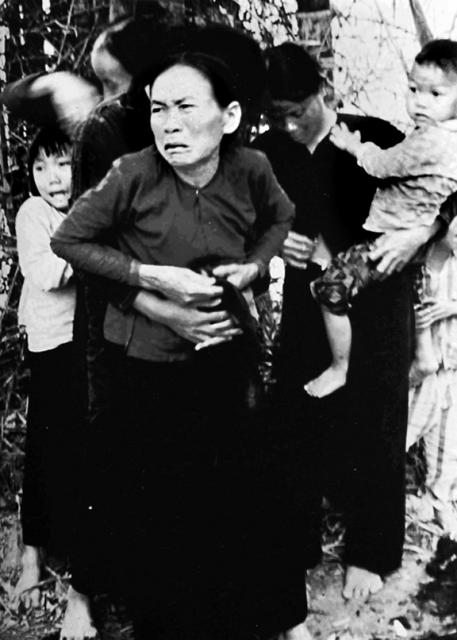 My Lai residents moments before being shot (Ron Haberle/WikiCommons)
My Lai residents moments before being shot (Ron Haberle/WikiCommons)
Several days later, a more superficially factual telling of this seemingly crushing blow to the enemy was featured in Southern Cross, the weekly newsletter of the 23rd Infantry (or Americal) Division, in whose “area of operation” the “daylong battle” had been fought. It was described by Army reporter Jay Roberts, who had been there, as “an attack on a Vietcong stronghold”, not an encounter with North Vietnamese regulars, as the Times had misconstrued it. However, Roberts’s article tallied the same high number of enemy dead. When leaned on by Lieutenant Colonel Frank Barker, who commanded the operation, to downplay the lopsided outcome, Roberts complied, noting blandly that “the assault went off like clockwork”. But certain after-action particulars could not be fudged. Roberts was obliged to report that the GIs recovered only “three [enemy] weapons”, a paradox that warranted clarification. None was given. It was to be assumed either that the enemy was poorly armed or that he had removed the weapons of his fallen comrades — leaving their bodies to be counted — when he retired from the field. Neither of the news outlets cited here, nor Stars and Stripes, the semi-official newspaper of the US armed forces, which ran with Roberts’s account, makes reference to any civilian casualties.
It would be nearly eighteen months later when, on 6 September 1969, a front-page article in the Ledger-Enquirer in Columbus, Georgia, reported that the military prosecutor at nearby Fort Benning — home of the US Army Infantry — was investigating charges against a junior officer, Lieutenant William L. Calley, of “multiple murders” of civilians during “an operation at a place called Pinkville”, GI patois for the colour denoting human-made features on their topographical maps of a string of coastal hamlets near Quang Ngai.
With the story now leaked, if only in the regional papers — it would migrate as well to a daily in Montgomery, Alabama — the Fort Benning public information officer moved to “keep the Calley story low-profile” and “released a brief statement that the New York Times ran deep inside its September 7, 1969 issue”, limited to three terse paragraphs on a page cluttered with retail advertising. The press announcement from the Army flack had referred only to “the deaths of more than one civilian”. In the nation’s newspaper of record, which also mentioned Calley by name, this delicate ambiguity was multiplied to “an unspecified number of civilians”. Yet, once again, the Times had been enlisted to serve the agenda of a military publicist and failed to approach the story independently.

